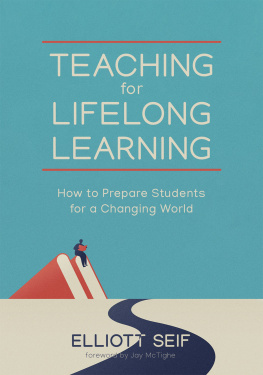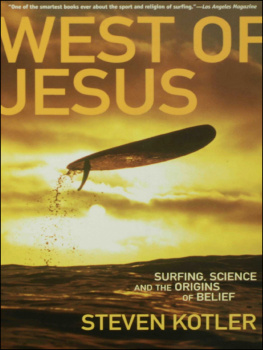TOO SIMPLE TO FAIL
TOO SIMPLE TO FAIL
A Case for Educational Change
R. BARKER BAUSELL, PH.D.


Oxford University Press, Inc., publishes works that further
Oxford Universitys objective of excellence
in research, scholarship, and education.
Oxford New York
Auckland Cape Town Dar es Salaam Hong Kong Karachi
Kuala Lumpur Madrid Melbourne Mexico City Nairobi
New Delhi Shanghai Taipei Toronto
With offices in
Argentina Austria Brazil Chile Czech Republic France Greece
Guatemala Hungary Italy Japan Poland Portugal Singapore
South Korea Switzerland Thailand Turkey Ukraine Vietnam
Copyright (c) 2011 by Oxford University Press.
Published by Oxford University Press, Inc.
198 Madison Avenue, New York, New York 10016
www.oup.com
Oxford is a registered trademark of Oxford University Press
All rights reserved. No part of this publication may be reproduced,
stored in a retrieval system, or transmitted, in any form or by any means,
electronic, mechanical, photocopying, recording, or otherwise,
without the prior permission of Oxford University Press.
____________________________________________
Library of Congress Cataloging-in-Publication Data
Bausell, R. Barker, 1942
Too simple to fail : a case for educational change / R. Barker Bausell.
p. cm.
Includes bibliographical references.
ISBN 978-0-19-974432-9
1. Effective teaching. 2. Motivation in education.
3. TeachersConduct of life. I. Title.
LB1025.3.B3894 2010
371.207dc22
2010014549
____________________________________________
1 3 5 7 9 8 6 4 2
Printed in the United States of America
on acid-free paper
Dedicated to
Nellie B. Bausell
Rufus B. Bausell
Devoted Parents and
Great Elementary School Teachers
CONTENTS
INTRODUCTION
Obsolete from Every Perspective
CHAPTER 1
The Science of Learning
CHAPTER 2
Dueling Theories
CHAPTER 3
Dueling Political Perspectives
CHAPTER 4
The Theory of Relevant Instructional Time
CHAPTER 5
The Science of What Could Be
CHAPTER 6
The Theoretical Importance of Tutoring and the Learning Laboratory
CHAPTER 7
Demystifying the Curriculum
CHAPTER 8
Using Tests Designed to Assess School-based Learning
CHAPTER 9
11 Strategies for Increasing School Learning
CHAPTER 10
Toward a More Focused Science of Education
CHAPTER 11
Implications for Reducing Racial Disparities in School Learning
CHAPTER 12
Getting There From Here
ACKNOWLEDGEMENTS
I would like to thank my graduate advisor and collaborator, William B. Moody, for giving me the opportunity to conduct much of the research that, decades later, largely informed the theory of school learning introduced here. Appreciation is also extended to Jodi Narde (Assistant Editor at Oxford) and Jais Alphonse (Project Manager) for their competence and conscientiousness in smoothly guiding the production process to fruition. The book was greatly improved by Marion Osmuns sage advice in helping me to shape its direction (and for reviewing multiple versions) before encouraging me to submit it to Oxford University Press. And finally a special acknowledgment to my editor, Abby Gross, for her unwavering support, enthusiasm, and belief in the importance of the project.
INTRODUCTION: OBSOLETE FROM EVERY PERSPECTIVE
Thirty-five students sit facing a single teacher. The teacher has just provided a brief but coherent introduction to a new topic, but one portion of her class couldnt follow what she was saying because they have had too little previous instruction on the subject at hand. Another portion of the class is terminally bored because they had previously learned 90% of everything the teacher said (or will say during the upcoming school year). A third contingent is distracted by two misbehaving boys seated at the rear of the room.
Recognizing these problems, and hoping to reinforce the main points of her lecture, she reseats the two boys on opposite sides of the room and has all the students open their textbooks to read the same page. Unfortunately, the same part of her class who couldnt follow her lecture, along with a significant portion of the students who were distracted, also has trouble reading the textbook. And of course the students who already knew what she was talking about already know everything contained on that particular page in their textbook.
Sensing that something is amiss, the teacher decides to vary her routine a bit and have everyone come to the front of the room and sit on the floor surrounding the chalkboard. Following a few minutes of jostling and confusion, the class then watches a student attempt to solve a math problem based upon what has just been taught and read about (by some). This particular student fails miserably and cant follow the teachers attempts to help him discover his error. The remainder of the class isnt at all interested in this process since some of them would have never made such an egregious mistake, some of them cant follow the teachers explanation, and some simply arent paying attention.
Later, with the students back at their desks, the teacher poses a question to the class on the topic. Some students raise their hand whether they know the answer or not; some wave their arms frantically because they are sure they have the correct answer (or simply want the attention); and everyone else waits for either the correct or the incorrect answer, or pays more attention to the myriad other competing activities that are constantly going on in the classroom, somewhat analogous to a cocktail party in which we stand in a crowded room with sounds and conversations going on all around us and must decide to what we will direct out attention and to what we will only pretend to do so.
What these and most other classroom instructional activities have in common is their mind-boggling inefficiency, the amount of time they consume, and the fact that at any given point in time only a portion of the students involved will be actually attending to themeither because the instruction isnt keyed to their particular needs or they are free to attend to competing activities that they find more interesting. And as if all of this were not enough, the teacher herself is most likely ill trained for her job. She probably graduated from a university-based school of education, which may have been staffed by faculty who knew very little about how to maintain order in a public school classroom, make instruction relevant for as large a percentage of such a classroom as possible, foster learning under typical classroom conditions, or even how to teach the types of content she is now charged with covering. And if teaching children to read is part of our teachers duties, she may have never even been given a cursory lesson on basic phonics instruction. In fact, it is possible that this teacher may never have enrolled in a single course that actually prepared her to teach children to read, to write, or to understand mathematicsperhaps because her faculty were never taught that themselves. An accident of history, perhaps, due to the disciplines early thinkers (such as Herbert Spencer, John Dewey) who were less concerned about increasing the amount students learned than they were about the philosophical and social implications of schooling. Or, of later popular theorists such as Jean Piaget, whose work would ultimately wind up having no recognizable application to classroom instruction.
Next page









